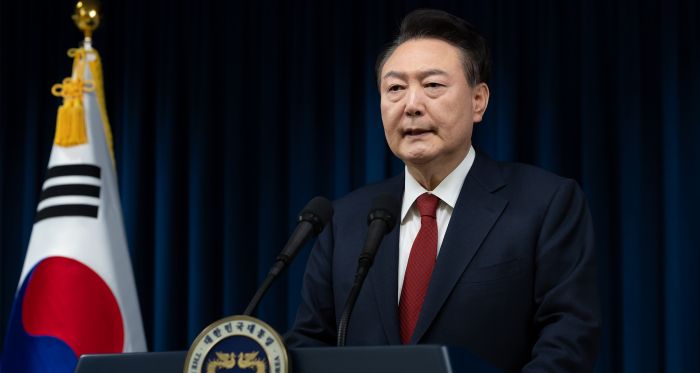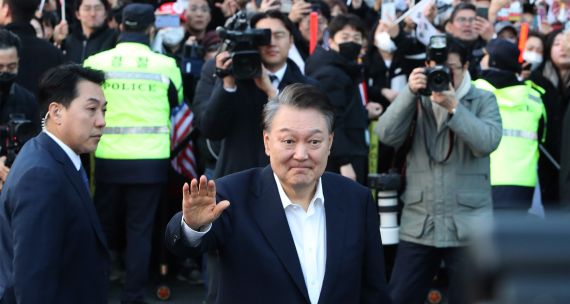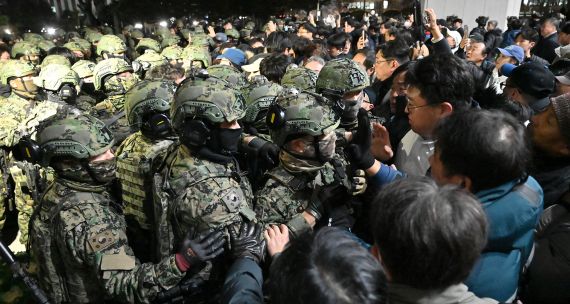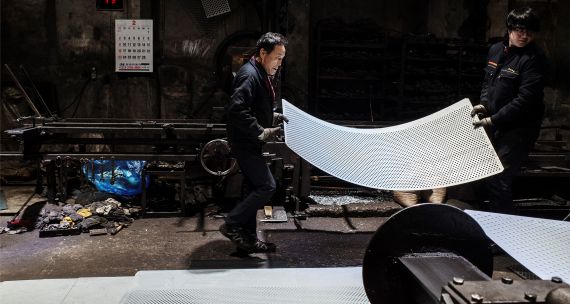At 10:24 p.m. local time on December 3, South Korean President Yoon Suk Yeol declared emergency martial law. It was followed almost immediately by a unanimous decision by members of the National Assembly to reject his declaration, forcing Yoon to rescind his earlier decision.
Shortly thereafter, the political opposition, headed by the Democratic Party (DP) of Korea, announced that the 300-member National Assembly would hold a vote on Yoon’s impeachment on the evening of December 7. But 105 of the 108 members of Yoon’s People Power Party (PPP) boycotted that vote, which was just enough to prevent the motion from reaching the two-thirds threshold needed. While Yoon has officially managed to hang on to his presidency, PPP leader Han Dong-Hoon announced Sunday morning that the party was seeking Yoon’s “orderly early retreat,” adding that he and Prime Minister Han Duck-Soo, not Yoon, will be overseeing domestic and foreign affairs in the meantime. The opposition has already vowed to go for another attempt at impeachment as soon as December 14.
What impact might this recent political drama have, including on South Korean foreign policy?
Martial law declaration in context
The declaration and swift rejection of martial law by parliamentarians can be understood in light of at least two contextual factors. First, South Korea remains a vibrant democracy in which parliamentarians can and do check the powers of the country’s president. Second, Korean society is highly divided between the progressives and the conservatives. These divisions, like the political divisions in many liberal democratic states, run deep and are rooted in history and dissatisfaction with political leaders’ inability to meet the challenges that each side is experiencing.
Yoon is a former attorney general with little political experience. In using his presidential power to impose and then revoke martial law, he was ostensibly hoping to overcome the country’s political gridlock. The progressive DP holds 170 of the 300 seats in the National Assembly and has used that majority to repeatedly block or reject Yoon’s domestic and international initiatives.
Regional and international dimensions
The back-and-forth over the martial law declaration has been highly destabilizing and raises questions about what kind of democracy South Korea is. It could also have profound implications for inter-Korean relations. The DP has had a long-term desire to engage in diplomacy with North Korea to reduce tensions and foster the conditions for working towards rapprochement, whether in the form of a peace treaty, demilitarization of the border that separates the two states, or steps toward a form of confederation in which the North and South could coexist.
The DP’s intentions, however, are complicated by Pyongyang’s proliferation of weapons of mass destruction, its extensive and nationwide repression of human rights, and now co-operation with Russia in fighting in Ukraine.
If South Korea continues down the path of bitter domestic political division, it may undermine the close co-operation that South Korea and the U.S. currently enjoy and erode the underpinnings of their decades-long alliance. That would destabilize the regional security architecture meant to deter North Korea from military provocations and prevent China from becoming a regional hegemon.
Moreover, Yoon’s possible or even likely removal through impeachment or resignation will have serious ramifications for the sustainability of the substantial progress his administration has made in the realm of foreign policy. That includes the historic agreement on closer U.S.-Japan-South Korea co-operation, reached at Camp David in August 2023; Yoon’s tough North Korea policy; and comments in support of Taiwan. All of these could be jettisoned by a DP-led government. Even the assistance that South Korea has provided to Ukraine bilaterally as well as through NATO Indo-Pacific Four co-operation may be cancelled or deprioritized, negatively impacting Kyiv’s fight against Russia.
This will expose South Korea to threats from the incoming Trump administration to pay more for security protection. Such threats could accelerate talks in South Korea about the acquisition of a domestically engineered nuclear deterrent, especially as there is increased anxiety in South Korea about the credibility of the U.S. nuclear and conventional deterrent under ‘Trump 2.0’ (these anxieties are mirrored in Japan as well among conservatives).
The martial law declaration and Yoon’s walk-back will impact the security situation in the Indo-Pacific region and in the Asia-Atlantic partnership by destabilizing South Korea’s political process and dramatically increasing the chances that DP leader Lee Jae-Myung, whom Yoon defeated by less than one percentage point in the March 2022 election, becomes South Korea’s next president.
Lee has been critical of the Yoon administration’s foreign policy towards China and Taiwan, intimating that “China was South Korea’s top export market, but now South Korea is importing mostly from China. Chinese people don’t buy South Korean products because they don’t like South Korea. Why are we bothering China? We should just say ‘xie xie’ (“thank you”) [to China] and ‘xie xie’ to Taiwan as well. Why do we interfere in cross-strait [China-Taiwan] relations? Why do we care what happens to the Taiwan Strait? Shouldn’t we just take care of ourselves?”
These positions will have negative implications for the U.S.-supported regional security architecture, co-operation on extended deterrence, Taiwan, and preserving an international order based on the rule of law. Japan could not help but to be alarmed by these positions, and Canada’s efforts to establish a foothold in the Indo-Pacific would be challenged if one of its North Pacific partners pivots away from what has been seen as the two countries’ shared values and interests in the region.
A potential Lee administration may also loosen sanctions on North Korea as part of its efforts to reduce tensions, enabling Pyongyang to expand its nuclear, chemical, and biological weapons of mass destruction (WMD) programs and to aid Russia in its illegal war against Ukraine. South Korean progressives have frequently blamed the U.S., specifically, the U.S. troops stationed in South Korea, for the prolonged tensions on the Korean Peninsula. A DP-led government would want to reduce the U.S. footprint in South Korea so it can begin a serious discussion with North Korea about a peace settlement. For Yoon, declaring martial law was a way to put these radical progressives back into a box and prevent them from — at least in his eyes — destabilizing the South Korean government. However, his miscalculation in declaring martial law, which was then unanimously rejected by the South Korean parliament, likely means that he will lose his position as president sooner rather than later.
What to expect next?
Yoon’s declaration and withdrawal of martial law has been followed by resignations within his advisory circle and recriminations by the minister of defence and other officials that they had no prior warning of Yoon’s intentions to declare martial law. Citizens have spontaneously gathered to call for his impeachment or for him to quit. Pressure will only continue to mount on the current president in the coming days and weeks.
Although for now, Yoon has narrowly avoided impeachment, the opposition has vowed to continue trying. Moreover, we are likely to see a more drawn-out legal process as Yoon attempts to explain his rationale for the martial declaration and to present evidence that the opposition party was indeed colluding with North Korea. If a future impeachment attempt succeeds, it could open a Pandora’s box, revealing to Korean citizens the collusive nature of politics on both sides of the political continuum. This includes the relationships between the DP leadership and both Beijing and Pyongyang.
In contrast, if Yoon decides to resign from his position sooner rather than later, the conservative PPP may be able to retain power until another election takes place. While not a panacea for Yoon’s disastrous declaration, it may provide some political breathing room for the conservatives to rally around an alternative conservative leader that could prevent the DP from a sweeping victory in the next election.
Consequentially, both Japan and the U.S. have cancelled visits to South Korea for the moment. Both are waiting to see how the political events evolve. In both cases, they are deeply concerned as to what political turmoil means for trilateral and bilateral co-operation, for maintaining peace and stability across the Taiwan Strait, and for collaboration on relocating semiconductor production away from Taiwan.
Russia, China, and North Korea will attempt to leverage Yoon’s political troubles to drive a wedge between South Korea and the U.S. and Japan. This could be through the deployment of disinformation into South Korea enhancing narratives about the trilateral partnership between Seoul, Tokyo and Washington being a de facto alliance that will bring war, not peace, to the peninsula. They may also be already positioning themselves to court a potential Lee government to end their support for what they perceive as U.S.-led initiatives to contain China and to topple the regimes in Pyongyang and Moscow.
Implications for Canada-South Korea relations
For Canada, South Korea’s recent political turmoil presents numerous challenges.
First, Yoon’s potential downfall and replacement of a conservative government with a progressive one will impact Ottawa’s Indo-Pacific engagement and priorities. Canada needs partners in the region that support an international order based on the rule of law, partners that are willing to use their diplomatic offices to maintain peace and stability across the Taiwan Strait, and those that committed to work with the U.S. to deal with the challenges facing the Indo-Pacific.
Second, Canada’s commitment to deterring China by working with like-minded states in the region could be weakened. While Canada remains in favour of engaging with China, it still needs strong partners to co-ordinate its diplomacy in the region.
Third, Canada has a deep interest in the continuation of many of the foreign policy initiatives launched by the Yoon administration, as they are aligned with our Indo-Pacific priorities. The possible replacement of the conservative Yoon administration with a progressive Lee administration would likely have a more anti-Japan, pro-China inclination that would complicate our ‘minilateral’ and multilateral efforts to be at the Indo-Pacific table and not on the menu.
• Edited by Erin Williams, Senior Program Manager, and Vina Nadjibulla, Vice-president Research & Strategy, APF Canada





